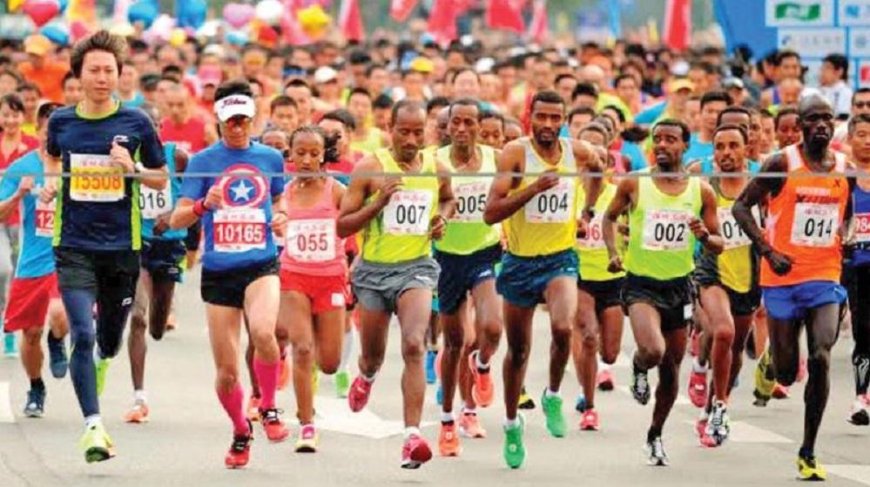The first start in a marathon - what should you remember?
it not only on the day of the competition, Learn some tips to help you enjoy an experience we should all try. The first start in a marathon.

A marathon is one of the most difficult tests we can subject our body to and we must remember about it not only on the day of the competition, Learn some tips to help you enjoy an experience we should all try. The first start in a marathon.
More and more people are running. This sport has gained enormous popularity and has turned into a real lifestyle for a large part of society. Those who practice running will inevitably be seduced at some point by the challenge of running a marathon for the first time.
Will you also take the next step and dare to run a marathon?
However, there are some fundamental aspects to consider before starting a race of this caliber. This way you will not let the first start in the marathon be your last. So how do you prevent inexperience from ruining this endurance test?
The first start in the marathon - how to prepare?
In addition to physical and mental preparation, there are several other aspects and possible mistakes to consider. One of them is related to weather predictions. It is important to pay attention to the weather forecast exactly for the race times.
Taking into account the weather conditions on the day of the race, we will be able to put on appropriate clothing and avoid uncomfortable situations and difficulties that they will affect.
You shouldn't wear new shoes for the first time in a marathon. They can cause abrasions and blisters which will ruin the experience.
It is advisable that both the shoes and clothes you wear while running are the same that you have trained in the previous weeks or even months.
For the last two weeks before the big day, you should slightly reduce your training activity. Thanks to this, we will approach the marathon with more energy and be better prepared for physical exertion. What is really recommended these days is to run less and rest more.
An additional detail that usually motivates marathon runners is meeting the encouragement of family and friends along the way.
The ideal thing to do to identify them without losing the concentration that physical exertion of that caliber requires, is to agree on the points where your loved ones will watch your run.
Food is important
On the eve of the race, it's important not to overdo it with the amount of food you eat at dinner. Many people find that a large plate of noodles for dinner will help their body the next day due to its high carbohydrate intake. However, this idea is a mistake and, on the contrary, can be counterproductive.
Must Read: Daily salt intake: how much should it be?
If we overeat the day before, it could cause indigestion that would frustrate our plans for our first marathon start. So it's best to eat a normal dinner the day before.
On race day, it is also advisable to eat a normal carbohydrate breakfast, such as a few toasts or a banana.
However, it is not recommended to eat a lot of fiber in the last hours before the start. The nerves and exertion of racing can speed up digestion and cause a lot of problems.
Iron plays a key role in endurance during a marathon. Deficiency of this mineral can affect performance and promote injuries.
It is important to check whether the diet of the prospective marathon runner is high in iron in the weeks leading up to the competition. This requirement is crucial to avoid the risk of so-called runner's anemia.
It's also not a good idea to try out new energy bars or snacks on competition day. It is best to take with you food that you have already checked and that is compatible with what you like. The first start in a marathon is not the time for experiments.
The big day has come!
When the day of the first marathon finally arrives, it's important to be on time at the starting point. This way we will avoid unnecessary stress.
That is why we have to leave the house well in advance. You must also have breakfast before leaving the house, even if your nerves say otherwise.
Before the first whistle, it is also a good idea to go to the toilet in order to complete the race without any problems. Already after the start of the race, it usually happens that in the first kilometer we panic and accelerate more than usual. This is not a good idea.
The only way to overcome this challenge is to run slowly, step by step, and persist. Don't forget that the goal is 42 kilometers, so it's better to dose your effort wisely.
Nor should you let other marathon runners interfere with your performance or concentration. In addition, you should focus on trusting your prior physical and mental preparation.
So don't feel hurt or discouraged if you are overtaken by elderly people or large groups of runners. Remember that this is your first marathon start. And the most important thing is to complete it.
Finally, we must try to enjoy this test. The first marathon will only take place once and it will be an unforgettable experience for sure.
